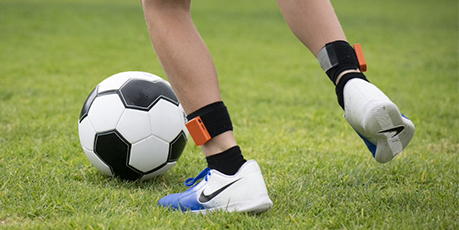New 'wearable tech' can improve a child's motor skills
Media release
Primary school teachers could soon have the specialist knowledge to assess children's vital motor skills, with the help of sensor technology created by Deakin researchers.
Known as 'XMo', the technology enables teachers to gather objective data on how well students perform seven key motor skills - kick, catch, throw, jump, hop, skip and side-step - via sensors worn on children's wrists and ankles during physical education class.
Deakin School of Education researcher Dr Natalie Lander says the technology will change how educators assess, correct and teach kids the motor skills that set the foundation for a positive and enduring relationship with physical activity.
"XMo empowers teachers who don't necessarily have the specialist training, or time, to identify and correct important movements," Dr Lander said.
"The technology measures each child's skills against a 'gold star' standard for performing the movement, telling teachers which specific aspect of the skill the student is doing well, which need improving, and how far the child is deviating from the correct way to perform the action.
"Motor skill proficiency is vital for children to be able to move competently and confidently. Getting these seven movement skills right sets students up for a lifetime of successful participation in a variety of physical activities including games, sport, and recreational activities," she said.
The technology is able to observe and report on an entire class simultaneously.
"By removing the burden from the teacher to try and identify issues and actively assess these motor skills, XMo gives educators back time to focus on teaching, while it gathers and reports back on student performance," Dr Lander said.
"XMo also removes the inaccuracies which result from subjective observation and assessment."
Three Deakin research groups collaborated to create the sensor technology - School of Education Research for Educational Impact School (REDI), Institute for Intelligent Systems Research and Innovation (IISRI) and Institute for Physical Activity and Nutrition (IPAN).
"The system is a prime example of what is possible when different faculties from the University combine their research expertise. REDI, IISRI and IPAN have developed an algorithm that can objectively assess the seven skills our kids need during their primary school years to ensure they develop a positive relationship with physical activity," Dr Lander said.
Now, Dr Lander and IISRI's Dr Darius Nahavandi want teacher feedback on the most useful way for educators to access and use this information in schoolyards, physical education lessons and ovals.
"This project has harnessed the capability diversity within each of our institutes. Together we've created the algorithm and measuring tools to gather the data, but this has to be user friendly and work in a teacher's world," Dr Nahavandi said.
"For example, this could be an app feeding information about what the student is doing correctly and incorrectly - in real time. Alternatively, the information can be read at a later time, allowing subsequent classes to be tailored to address the motor skills that need future attention within a group."
The Moving the Next Generation project is supported by the Victorian Government.

